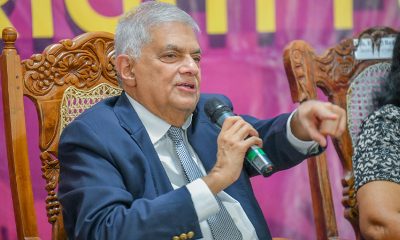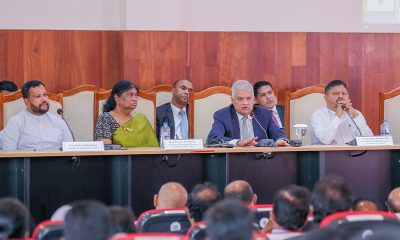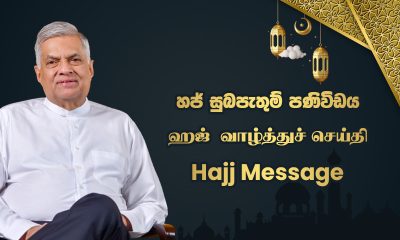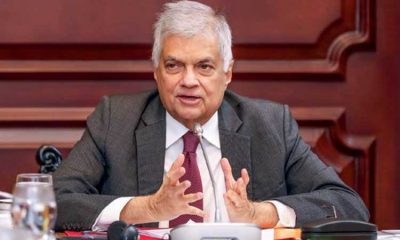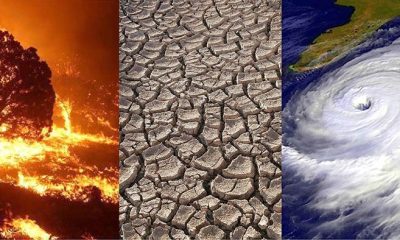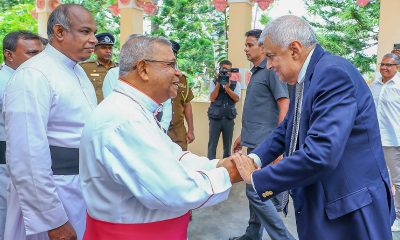Editorial
RW’s straw in the wind

President Ranil Wickremesinghe a few days ago suggested that countries like ours, losing skilled professionals to the developed world, explore the possibility of those countries employing our people compensating us for the loss of human capital educated at home at taxpayer expense. We are not the only Third World country paying the price of losing skilled professionals like doctors, engineers, academics and others due to the so-called “brain drain.” Rich countries can offer greener pastures to skilled workers including professionals and the emoluments, facilities, living conditions and numerous other attractions enabling revolutionizing lifestyles of the beneficiaries prove irresistible to many. They are not loath to seize the rewards on offer.
The straw that Sri Lanka’s president has floated in the wind is backed by considerable moral authority. But it will require a massive collective effort by all affected countries to make First World nations deliver. There are ongoing processes in many rich countries, the Netherlands being the latest, to apologize for their role in the global slave trade but reparations cannot be realistically expected. Some of the imperial powers of yesteryear have begun a painfully slow process of returning cultural treasures looted from their colonies. A few of them are attempting to accord some semblance of justice to indigenous people pillaged and slaughtered by immigrants from European and other countries. But there can be no quick fix to any of these historical injustices. Ranil Wickremesinghe’s straw will most likely be floating in the wind for a very long time.
The professional and other white collar migrants to develop countries generally immigrate with their families and make new homes and lives for themselves in the countries of their domicile. Whatever they save is mostly held in the countries in which they live. There are people with obligations to parents here in Sri Lanka who send money for their support. While some may eventually come back in their retirement to the land of their birth, very few, if any, will bring back their capital amid the economic uncertainty prevalent here today. Blue collars on the other hand leave their families back home in Sri Lanka and remit most of their earnings to support their dependents here.
The Director General of Health Services (DGHS), Dr. Asela Gunawardena went on record earlier this year saying that about 700 doctors including some medical consultants had migrated last year. According to the GMOA about 125 consultants are among about 477 doctors who had migrated up to the end of August last year. Given that there are about 20,000 serving doctors and 2,800 consultants in the country at present according to Health Ministry figures, such attrition makes a sizable dent in the availability of medical facilities. Though no reliable figures are available for other professions like engineering and academia, the broad brush picture would approximately be the same. We are losing too many of our best and brightest to other countries.
Among prospective immigrants among professionals, there is too little feeling among many that they owe their country a duty for the free education they have received right through university. There is no concept that taxes largely paid by the country’s poor enabled such education. We are not aware of the number of bonds signed and broken by various individuals who have gone abroad either on scholarships or at government expense and failed to return home. Usually foreign scholarships externally funded are not conferred on individuals but on countries. But there are recipients who do not see it that way. Sad but true, self interest is very much a part of human nature.
It is in this context that our columnist Nan, whose weekly People and Events column has been a regular feature in this newspaper for many years, has written a heartwarming account of the tremendous work done by a retired doctor who had long worked in the UK and returned to his homeland to do some marvelous work in the north of our country. This benefactor who allowed himself to be interviewed after much coaxing, laid down the strict condition that he must not be named if the story of what he had done is published. Not for him the blare of publicity. What Nan has written is a must read. It tells a story of a person who has not forgotten what his homeland has done for him with a heart big enough to share his good fortune with those not similarly blessed.
In this context it is worth recalling what Dr. PR Anthonis, the brilliant surgeon whose name was a household word in his day, said during a newspaper interview the day he retired from government service. “I owe all my skills to the poor people of this country on whom I operated in government hospitals,” he declared in a clear admission that his skills were developed by practice and experience gained by treating patients too poor to afford private health care.
Today a section of the Tamil diaspora is dangling a carrot of investment here in an effort to influence the political direction of resolving the problems, whether perceived or real, of their community. There are a large number of people of Sri Lankan descent living in many parts of the world with considerable capital they may be persuaded to invest here if there convinced of the safety of such investment and a fair return. These are all possibilities that must be mobilized.
Editorial
Trump in a china shop

Friday 11th April, 2025
US President Donald Trump has made another U-turn––a historic one. He has suspended unprecedented tariff hikes he announced the other day; he vowed that he would neither pause nor waive them under any circumstances. The 90-day tariff reprieve he has opted for has gladdened many hearts and made stock markets soar across the word, but a global recession is looming with a fierce tariff war between the US and China intensifying.
Trump has jacked up tariffs on all Chinese goods to a whopping 125%. China has stopped dilly-dallying and increased its tariff on imports from the US to 84%. The White House is reported to have said those who do not retaliate will be rewarded. Trump may have expected the Chinese leaders also to bow and scrape before him, asking for a tariff reduction.
Meanwhile, President Trump will have a hard time repairing relations with the traditional US allies in Europe. He did not mince his words, when he said, while announcing the new US tariffs, the other day, that many Americans thought Europe was a friend but it had actually ripped off the US. He has shown, albeit unwittingly, that Europe cannot trust the US as an ally. Besides, Der Spiegel, a German magazine once revealed that the CIA had been operating a global network of 80 eavesdropping centres, including 19 listening posts in Europe.
The White House has sought to help Trump save face; it has claimed that his flip-flop is part of a strategy to further US economic interests globally. But the truth is otherwise. Trump got cold feet as stock markets tumbled the world over, and protests erupted in the US itself against his new tariff policy. Initially, he, true to form, chose to dig his heels in, and even coined a new word to disparage the critics of his tariffs. On Truth Social, he called them ‘panicans’. He said: “The United States has a chance to do something that should have been done DECADES AGO. Don’t be Weak! Don’t be Stupid! Don’t be a PANICAN. Be Strong, Courageous, and Patient, and GREATNESS will be the result!” He also said, “Be cool! Everything is going to work out well. The USA will be bigger and better than ever before. On Monday, he announced from the White House that “we’re not looking at” a tariff pause …” He also bragged in a Truth Social post announcing the 90-day tariff pause, that “more than 75 Countries” had called US officials seeking to strike new trade deals. But it is clear that he had to bite the bullet and suspend the tariff hikes. The EU has put its retaliatory tariffs on hold, as a result.
The suspension of US tariff hikes has brought immense relief to the developing countries dependent on the US as a major export destination, but prudence demands that they continue with their efforts to formulate strategies to ensure the survival of their fragile economies in the worst-case scenario. They had better consider the tariff reprieve at issue only an interval in hell, as it were, and brace themselves for what is to come after three months.
Trump’s strategy of using tariffs to subdue the world has yielded some unintended benefits, the main being that it has prompted other nations, including traditional American allies, to realise the risk of being overdependent on the US as a trading partner, diversify their trade relations as well as exports, and, most of all, look for an alternative to the US. The on-going efforts to adopt an alternative international reserve currency is bound to gain a turbo boost from Trump’s abortive bid to leverage America’s hold on the global economy to undermine other nations.
The world owes President Trump a big thank you—not for jacking up US tariffs and then suspending them but for having revealed how far the US is ready to go to further its interests at the expense of the other nations, including its allies.
Editorial
Cushioning tariff shock

Thursday 10th April, 2025
President Anura Kumara Dissanayake’s letter to US President Donald Trump over the US tariff hikes has received much publicity. The NPP government is reportedly sanguine about a positive response from Washington to its request for lower tariff on Sri Lanka’s exports, especially apparels. Hope is said to spring eternal, and there is nothing wrong with being optimistic, but it behoves Sri Lanka to prepare for the worst-case scenario. President Trump’s mind is so elusive that it is not possible to predict his moves, much less guess what he expects the smaller economies to do if they are to qualify for US tariff reductions, if any. He is eyeing mineral resources in Ukraine in return for US military aid to that war-torn nation. Sri Lanka has no such resources to offer. Is the Trump administration trying to pressure it into going out of its way to help further Washington’s geostrategic interests in this part of the world?
China has retaliated by increasing tariffs on imports from the US thereby aggravating global economic uncertainty. Washington says its tariff increases are reciprocal, and therefore the countries affected by them may think they can gain relief by reducing duties on US exports. But the question is whether such action will help the US rectify its massive trade imbalance significantly. The demand for American exports will not increase substantially even if countries like Sri Lanka lower duties thereon, for factors such as cost and quality basically drive demand. Imports from the West, especially input materials, are not in high demand in the developing world because of the availability of cost-effective alternatives.
So, the Trump administration is likely to insist that apparel producing nations like Sri Lanka import commodities such as cotton fabric from the US so as to give a fillip to the American industries. This is what US Ambassador Julie Chung told former Minister Mano Ganeshan at a recent meeting, according to a report we published on 27 March. Such a move is bound to increase the cost of Sri Lankan apparels because US products are very expensive and will adversely affect the competitiveness of Sri Lanka’s apparels in the global market.
President Trump is hopeful that ‘jobs and factories will come roaring back’ because of the tariff hikes at issue, but he does not seem to have factored in the high cost of production in the US and increases in the prices of imports due to high tariff hikes. Tech analysts have pointed out that Apple iPhone prices would soar if they were to be made in the US, and even if the existing supply chains are maintained, their prices will increase substantially. The same may hold true for other commodities, whose prices remain low in the US at present owing to cheap labour and lax environmental laws in the other countries where they are produced.
The countries hit by the US tariff increases have adopted different strategies to cushion the blow from the drastic US action, which has led to a global stock market rout, and sparked protests in the US itself. India is seeking to strike more trade deals with other nations, according to Indian Finance Minister Nirmala Sitharaman, who says such measures have become necessary in view of prevailing global uncertainty. Sri Lanka can learn from how India is trying to mitigate the impact of the US tariff hikes.
Prof. C. A. Saliya, a senior banker turned academic, has pointed out in his latest column, Out of the Box, in this newspaper that if the emerging economies get their act together, they may be able to turn disruptions caused by the isolationist, protectionist, and coercive US trade practices into an opportunity to diversify their exports and trade relations, invest in technology and undertake structural reforms to ensure their economic resilience.
Meanwhile, the formulation of Sri Lanka’s strategy to navigate the new US tariff regime should arise from a tripartite effort if it is to be effective. The government, industrialists and workers should be represented in discussions on the issue. It is high time trade unions shifted their focus from their demand-oriented activism to the pressing need to play a crucial role in protecting the domestic industrial sector. The government should do everything in its power to help industrialists keep costs manageable, ensuring the competitiveness of their products in the global market, and the captains of industry must carry out their export operations in a transparent manner without resorting to sordid practices such as parking most of their export proceeds overseas.
Editorial
Lies, damned lies, and political claims

Wednesday 9th April, 2025
Hardly a day passes in Sri Lanka without the government and the Opposition locking horns and trading allegations of deception, lying and corruption. Deputy Minister of Vocational Education Nalin Hewage, who is at the forefront of the government’s propaganda campaign against the ruling NPP’s political rivals, has caused quite a stir by making a false claim about Sri Lanka’s economic recovery process.
Politicians as well as their mistruths, half-truths and blatant lies are rarely, if ever, out of the news in this country. Politics is generally thought to be a web of deceit, intrigue and lies due to manipulation, horse dealing, dishonesty, power struggles, scandals, corruption and other negative factors it is often associated with.
It may not be fair to paint all politicians with the same brush and label them as liars; there are honourable men and women in politics. However, the general perception is that only the politicians following Machiavelli, who has argued that rulers sometimes have to resort to deception and lying, achieve success in Sri Lanka. This view is not without some merit if our experience with politicians’ claims is anything to go by.
Most Opposition politicians who were lucky enough to survive last year’s Maroon Wave, which swept the NPP to power with a steamroller majority, are lying through their teeth. Denying allegations of corruption against them, they make themselves out to be paragons of virtue, but they won’t account for their wealth. It has now been revealed that the SLPP politicians who lost some of their properties due to mob violence in 2022 falsified the estimates of their losses and obtained compensation far exceeding the actual damages. They also have the audacity to make absurd claims and insult the intelligence of the public. Prior to the 2019 presidential election, the SLPP propagandists claimed that a huge cobra had emerged from the Kelani Ganga and it was a miracle signalling the rise of their candidate to the presidency. When the first Treasury bond scam was committed in early 2015, most UNP parliamentary group members, some of whom are in the SJB at present, told blatant lies in a bid to cover it up.
Deputy Minister Hewage has come under a social media piranha attack, as it were, over his claim at a recent NPP local government election rally in Galle that when the NPP took over the reins of government, last year, Sri Lanka’s foreign reserves had plummeted to USD 20 million, and under the incumbent government they had increased to USD 6.1 billion. Interestingly, disappointed that his claim had not elicited a rapturous applause, Hewage faulted his audience!
Hewage is not alone in claiming that it is the incumbent government that put the economy back on an even keel. Almost all NPP leaders make that claim at political rallies. Besides, they have sought to grab the credit for the completion of some projects previous governments launched, such as the restoration of the Elephant Pass salt factory and the construction of a cold storage facility in Dambulla. What takes the cake is the NPP’s claim that the country has gained nothing since Independence.
It will be interesting to see the NPP’s reaction to Hewage’s claim, which continues to draw heavy criticism on social media. The CID is conducting a probe into SLPP National Organiser and MP Namal Rajapaksa’s law exam results. Going by the absurd claims made by the ruling party politicians, it looks as if the NPP government had to order an investigation into the educational qualifications of some of its own parliamentary group members, especially those who claim to be economic experts.
-

 Business4 days ago
Business4 days agoColombo Coffee wins coveted management awards
-

 Business6 days ago
Business6 days agoDaraz Sri Lanka ushers in the New Year with 4.4 Avurudu Wasi Pro Max – Sri Lanka’s biggest online Avurudu sale
-

 Features5 days ago
Features5 days agoStarlink in the Global South
-

 Business6 days ago
Business6 days agoNew SL Sovereign Bonds win foreign investor confidence
-

 Features2 days ago
Features2 days agoSri Lanka’s Foreign Policy amid Geopolitical Transformations: 1990-2024 – Part III
-

 Features5 days ago
Features5 days agoModi’s Sri Lanka Sojourn
-

 Midweek Review2 days ago
Midweek Review2 days agoInequality is killing the Middle Class
-

 Features4 days ago
Features4 days agoSri Lanka’s Foreign Policy amid Geopolitical Transformations: 1990-2024 – Part I


